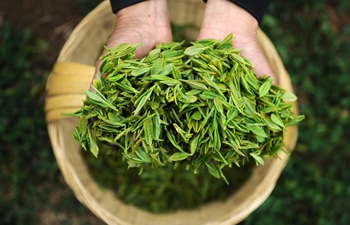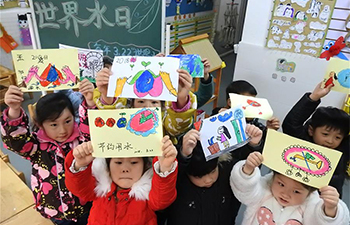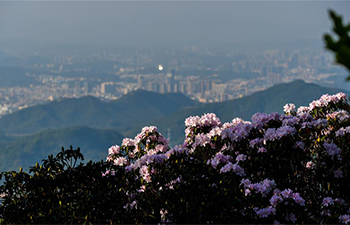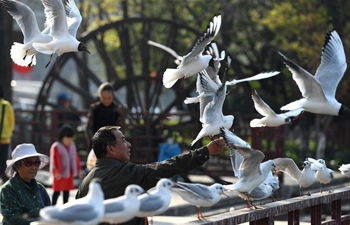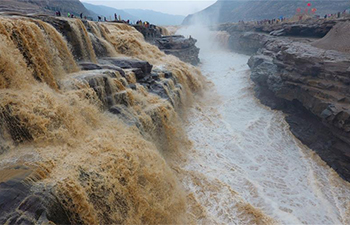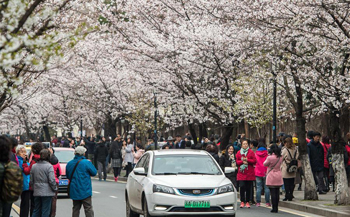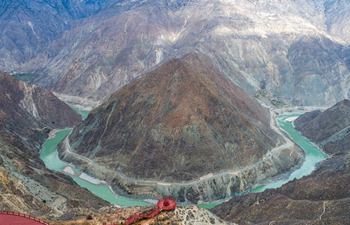BEIJING, March 22 (Xinhua) -- Veteran Lyu Qingrong, 55, is a well-known "river guardian" in his hometown, Xingjiagou Village in northeast China's Liaoning Province.
Over the past 34 years, he has collected nearly 100 tonnes of garbage with his bare hands along the banks of the Biliu River, a major water supply source for Dalian, a coastal city with about eight million people.
Lyu started collecting garbage in 1984 when he retired from the army and became a forest ranger. Lyu was one of the earliest environment volunteers at a time when public awareness was low.
"The Biliu River was covered in garbage and dead animals. When I started to pick garbage, people said I was stupid and what I was doing was shameful," he said.
He persuaded his wife Zong Haili, a village school teacher, to join him. "I felt embarrassed in the beginning. I tried not to be seen by other villagers when I collected garbage," Zong said.
The couple used their own money to purchase garbage bags and continued their voluntary work for years. "I'm not stupid like people said. I was just doing something different in a time when most people did not realize the need to protect the river and the environment," he said.
Now the province's environment volunteer team has 2,000 members. "I want to build a museum about environmental protection to engage even more people," Lyu said.
The central government has pledged to build a "Beautiful China," with unprecedented efforts to be put into environmental cleanup.
Official statistics show that the central government invested a record high of 226.6 billion yuan (about 34.3 billion U.S. dollars) in water conservation projects in poor regions between 2012 and 2016.
The investment enabled 110 million rural residents to have safe drinking water, built water-saving irrigation systems on about 2.3 million hectares of farmland, and treated water and soil erosion on 41,000 square kilometers of land.
On the World Water Day, which falls on Thursday, public campaigns have been launched to raise awareness of saving and conserving water.
On Thursday, Binzhou City in east China's Shandong Province called on members of the public to save water. Last year, it reduced water supply on the day to remind them to use less water.
Lake inspector Wang Ye has experienced a water crisis and knows preserving the water resources is critical. Wang works at Taihu Lake, a key body of water which supplies residents of the Yangtze River Delta.
In 2007, an algae outbreak in the lake led to a large-scale water crisis for the city of Wuxi. "Nearly two million people had no clean water to drink. It was a nightmare," he said.
In the last ten years, Wuxi spent over 50 billion yuan in fighting pollution in Taihu Lake. Over 3,000 factories were closed and another 3,200 were relocated.
Wang drives his speed boat around the lake daily to collect data on water quality. "The quality of lake water has been restored to what it was like 20 years ago, before the pollution," he said.
Rising awareness is leading to more efficient use of water and better conservation efforts.
At the popular tourist resort Shanghai Disney, processed lake and river water, instead of tap water, is used instead for irrigation and cleaning.
The practice helps save millions of cubic meters of tap water every year, the resort said.
In water-guzzling industries, such as vegetable growing, more efficient machinery is being used.
In Gaomi, a vegetable production base in Shandong, farmers now water their plants using sprinklers with an adjustable water flow. The irrigation systems help save half the water previously used by diesel pumps.
"I've invested three million yuan in better irrigation facilities. If the water is gone, no matter how rich you are, you have no way to buy it. The best way is to save it and not to overuse the resources," said Wang Cuifen, a farmer in Gaomi.
In the even more parched northwest, farmers use a plastic membrane to keep corn seeds humid. Farmers at Shitan Village, Gansu Province only see 400 millimeters of rainfall every year.
"We try our best to keep the rainfall that nature gives us," said Ran Wang'er, a corn farmer.
"The membrane can be used for two years, and is then given to recycling companies. Farming was like gambling before, but now technology brings us a steady income. I made 18,000 yuan last year," he said.




